Last updated: November 2023
Background
While the COVID-19 pandemic has exposed vulnerabilities in rural health, it has also highlighted strength and resilience. Lessons learned from rural community responses to COVID-19 may be applied to other community-level health challenges, such as climate change. Rural community resilience is a function of reducing vulnerability to unexpected events including disasters or disease outbreaks and enhancing community capacity to respond to these threats. Recognizing resilience means selecting strengths and capacities needed for coping, adapting, and transforming weaknesses from the previous system.
For the purposes of this study, community resilience is defined as the process of and capacity for a community to prepare, mitigate, respond, and adapt to a stressor.1 However, recent scholarship has also expanded the definition to include: “the magnitude of change or disruption that a system can absorb before shifting to an alternative [or new] regime or state.”2 This concept of transformative resilience, or improving a system as a result of a stressor, is important within the contexts of COVID-19 and climate change. This study is interested in not only understanding how rural communities coped and were able to operate under a ‘new normal’, but also how rural health systems and communities as a whole can build more resilient systems in the face of climate change and ecosystem disruption.
- Kulig JC. Community Resiliency: The Potential for Community Health Nursing Theory Development. Public Health Nurs Boston Mass. 2000;17(5):374–85
- Cinner JE, Barnes ML. Social Dimensions of Resilience in Social-Ecological Systems. One Earth. 2019 Sep; 1(1):51-56. doi: 10.1016/j.oneear.2019.08.003
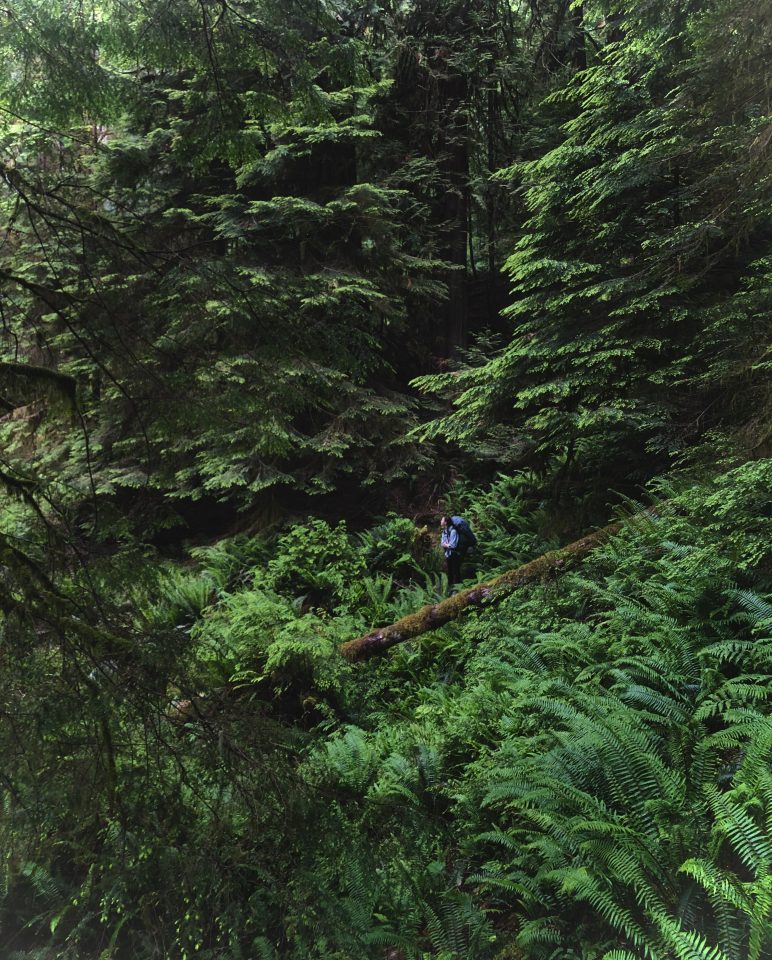
Project Timeline
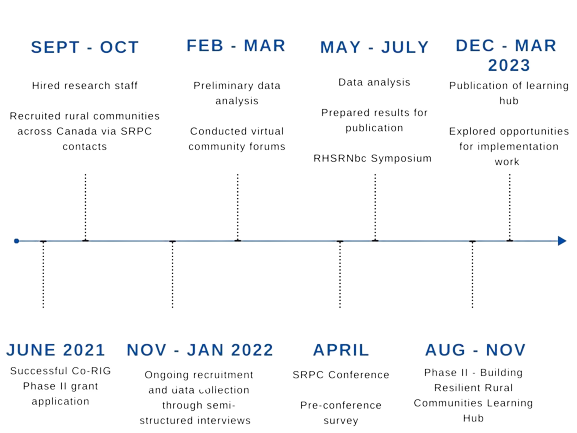
Objectives
In 2021, the RHSRNbc was awarded the Co-RIG Phase II grant facilitated by the Foundation for Advancing Family Medicine and the Canadian Medical Association foundation to explore the resilience of rural communities during the COVID-19 pandemic. The project titled ‘Climate Change and Ecosystem Disruption Adaptation Responses in Rural Canada’ (CCEDARR) sought to better understand how rural Canadian communities coped during the pandemic and how these lessons could be translated to strengthening the response to climate change and ecosystem disruption.
Specific objectives included:
- Identify the characteristics of signal rural communities that have demonstrated resilience in the first year of the pandemic and understand the strategies and innovations that enabled these communities to cope;
- Develop a framework and toolkit for enhancing rural community resilience using the responses to the COVID-19 pandemic that can be applied to a range of threats;
- A pre-intervention survey of rural communities across Canada to assess the emergence of these strategies and innovations;
- Create an educational intervention to engage and disseminate these findings and stories from resilient communities at the April 2022 Society of Rural Physicians of Canada conference;
- Evaluate the research program through demonstration projects and a post-intervention survey.
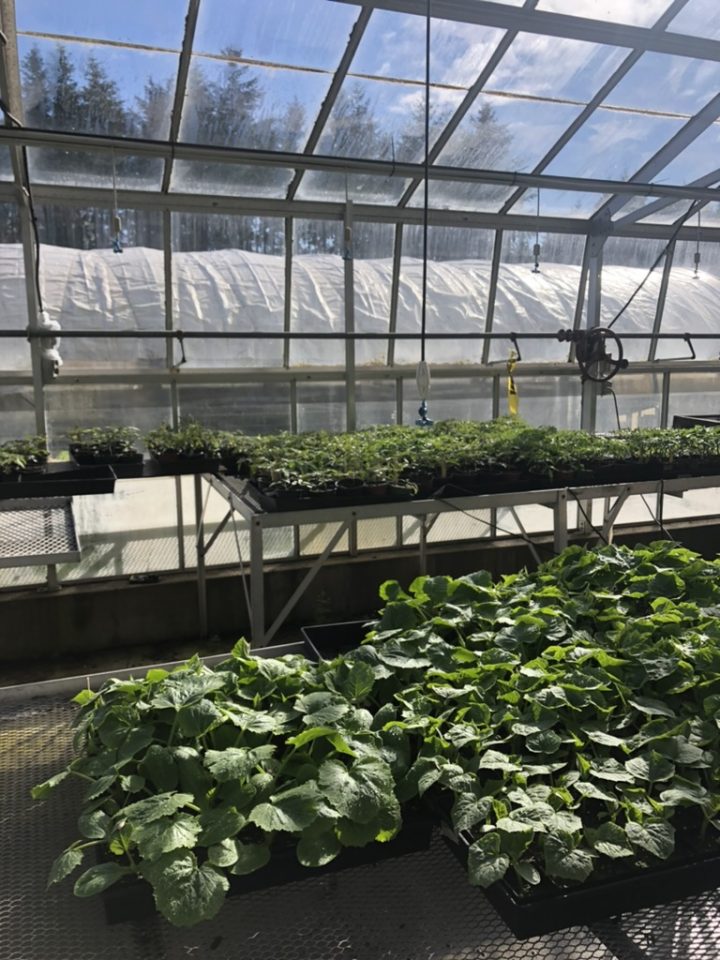
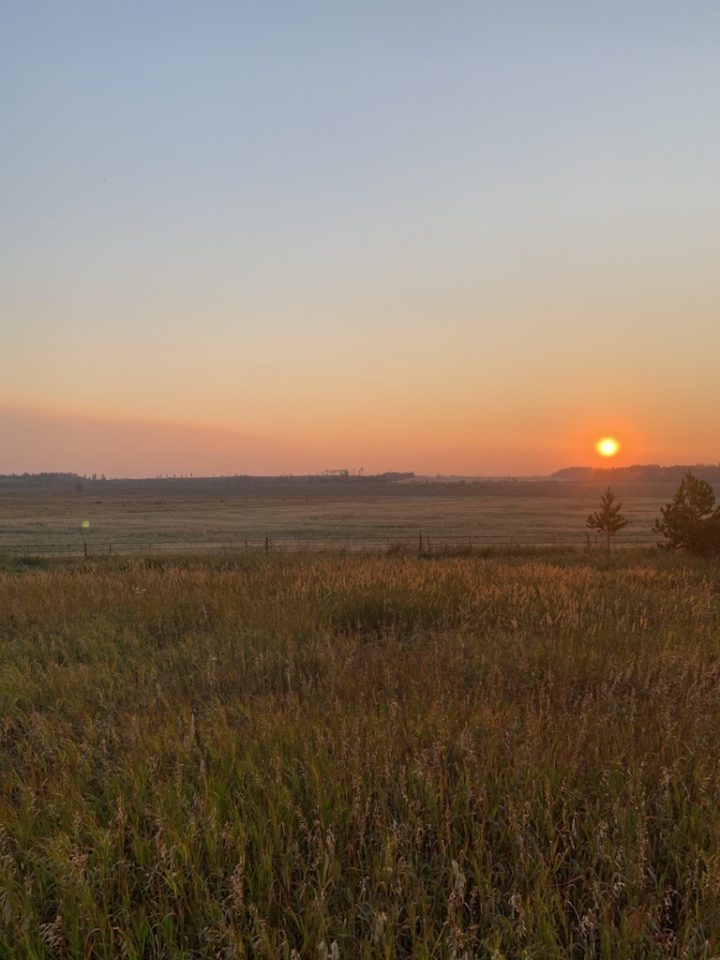
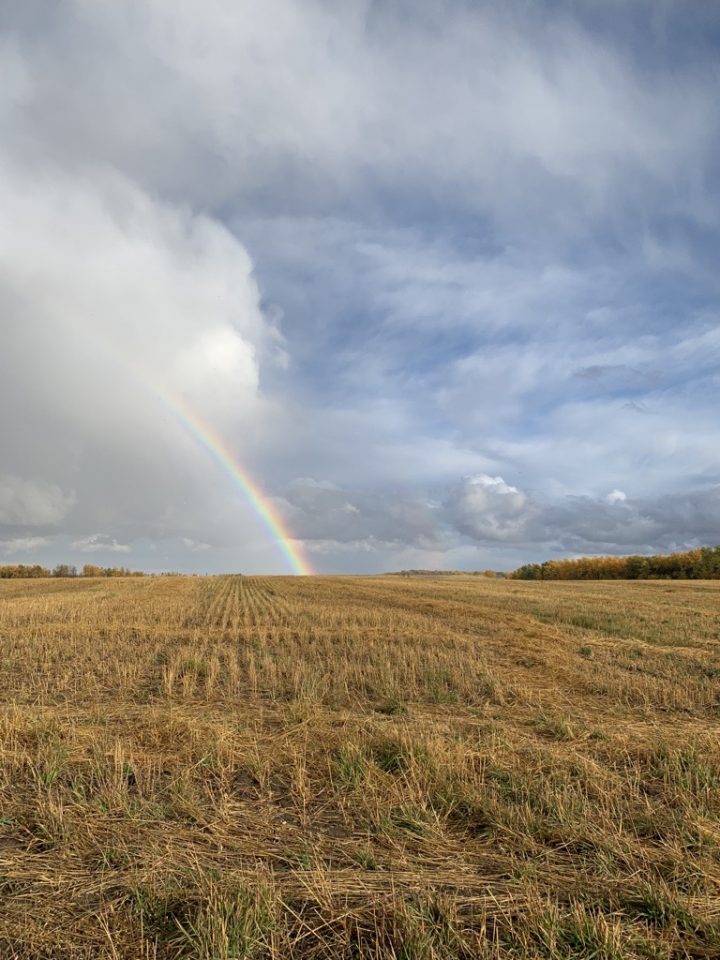

Methods and Key Findings
Methods
Through the eighteen month project rural physicians and community members shared their experiences through COVID-19 and hopes for their community in the face of climate change. The Society of Rural Physicians of Canada supported recruitment and snowball sampling was employed until the research team felt saturation had been reached. A qualitative exploratory approach was adopted, using semi-structured virtual interviews with participants. Ultimately, the team conducted 64 interviews (27 physicians, 8 health care team members, and 29 community members) across 22 Canadian communities (7 in BC, 7 in AB, 2 in SK, and 6 in ON). Once individual data collection was complete, the team hosted 6 virtual community forums, three of which were community specific and three were regional. The goal of the community forums was to return the findings to the communities and ensure that we had acquired a fulsome picture of experiences of resilience during COVID and perspectives on the threats of climate change. The transcripts of the interviews were then professionally transcribed and thematically analyzed in NVivo 12 by a team of researchers.
Key Findings
Through the analysis of the qualitative findings, several key themes emerged as important to community-level resilience during the COVID-19 pandemic as identified by participants. These included:
- Importance of community connection and commitment to community well-being prior to and during the pandemic
- Trust in medical and municipal leadership
- Developing effective models of communication between healthcare providers and the community, particularly during the early stages of the pandemic
- The role of rural family doctors as leaders; influence of payment model on a physicians ability to engage with community external to clinical time
- Implementing innovative means of care provision especially with scarce resources
The majority of participants, both care providers and community members, felt that their experiences through the pandemic would help guide their responses and resilience initiatives in the face of climate change and ecosystem disruption. Although, many shared that they felt as though their communities were ill prepared to cope with both emergent climate disasters and long term adaption. Most participants told us that trust in their care providers remained high or increased through the pandemic and that this was encouraging as the health effects of climate change are becoming more widespread. Largely, the communities that reported higher levels of community resilience were those that had responsive care teams, a strong ethos of volunteerism, and pre-existing community supports in place such as food recovery depots.
A further analysis of these findings are included in a series of forthcoming publications.
The findings of this work were also synthesized in an online learning hub, Building Resilient Rural Communities: Responding to Climate Change & Ecosystem Disruption. The learning hub is a free, online resource compiled for the use of students, teachers, academics, and engaged advocates wanting to take action in the face of climate change and ecosystem disruption. The goal of the work is to outline the realities of climate change in rural Canada, specifically in reference to health and healthcare delivery, but also, and arguably more importantly, to inject a sense of optimism and a way forward into the discourse. The work contains three key elements: a fictional narrative depicting the story of a young girl in a rural community dealing with the effects of climate change, scholarly material, and participant video clips. Each part of this hub is intended to engage the reader in various ways, through story, traditional academic text, and lived experience and perspective. Also included are chapter infographics and discussion questions which can be used to develop curriculum. This is an evolving piece of work that will be adapted and added to as our work progresses.
Ongoing work
When the RHSRNbc team wrote and published the online learning hub the goal was to create a resource for youth, educators, and advocates to educate about the realities of climate change in rural Canada, explore ways in which resilience could be strengthened, and encourage collective action. Since the first phase of the CCEDARR research grant concluded and the learning hub launched, the team has been engaged in finding ways to move the work forward with a focus on implementing the ideas presented in the resource. A few of the projects we are currently pursuing include:
- Creating a Climate Action Implementation Framework
- Aid in connecting physicians and healthcare teams with the resources required to formulate climate change focused implementation programs within their own rural communities
- The framework proposed presents a series of themes from which implementation projects could be generated (i.e. food security, hazard management, education, climate justice initiatives)
- Building Resilient Rural Communities Learning Hub Volume II
- The sequel of the learning hub will focus on implementing the ideas presented in volume I
- More perspectives will be included through videos, chapter authorship, and case studies
- Working with rural communities to implement community-driven and led climate resilience building initiatives
Contact us
If you have any questions about the CCEDARR study, please email us:
Principal Investigator: Stefan Grzybowski; stefan.grzybowski@ubc.ca
Research Coordinator: Alex Bland; alexandra.bland@ubc.ca

